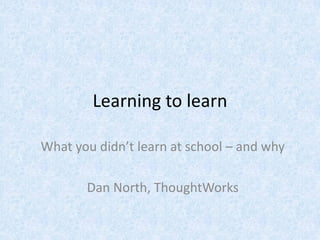Weitere ähnliche Inhalte Ähnlich wie Learning To Learn (20) Kürzlich hochgeladen (20) 2. Meet the “Gang of Three”
Socrates
Dialectic: logic and argument
469–399 BC
Plato
Reality as a projection
Aristotle
428–348 BC
Categorisation
Inclusion and exclusion
384– 322 BC
© Dan North, ThoughtWorks 2
3. These men shaped how we think
We focus on what is rather than what could be
Pointing out what is wrong
We don’t value instinct
“It’s just a hunch”
“It just feels right”
We use logic to argue from cause to effect
© Dan North, ThoughtWorks 3
4. Example: modern legal systems
Laws based on ethics
It is wrong to kill someone, usually
Dialectic between prosecution and defence
No (explicit) value on emotion or feelings
Purpose is to “prove beyond reasonable doubt”
Rather than find “most intuitively sensible outcome”
© Dan North, ThoughtWorks 4
5. Reality is more complex
Factors influence one another in loops
either reinforcing, balancing or damping
The shower
being too hot Being addicted
or too cold to drugs Committing
petty crime to
pay for drugs
The amount I
move the dial
Being in prison
with easy
access to drugs
© Dan North, ThoughtWorks 5
6. Systems Thinking
Looks at the system as a whole
Overall effectiveness rather than local efficiency
Feedback loops rather than cause-and-effect
Metrics are indicators of trend, not targets
The system is greater than the sum of the parts
What is the individual contribution of a coach?
One globally-optimising target
“Does it make the car go faster?”
© Dan North, ThoughtWorks 6
7. Western society is based on targets
Schools have SATs, GPAs, school league tables
Businesses have KPIs, SLAs, budgets, sales targets
Hospitals have waiting lists, more league tables
Even trains have punctuality targets (in the UK)
But targets are based on a logical fallacy!
© Dan North, ThoughtWorks 7
8. The fallacy of targets
A good school will produce high exam results,
therefore a school with high exam results is a
good school
All cows have four legs, so all four-legged
animals must be cows
We assume only this cause can give this effect
© Dan North, ThoughtWorks 8
9. You can always “game” targets
Improve school exam results
Reduce hospital waiting lists
Increase train punctuality
The tail is wagging the dog!
© Dan North, ThoughtWorks 9
10. How we learn in school
“Open your books at chapter 12 and read”
Sitting and listening to history
“3 minute” attention span, based on eye movement
Individual rote learning
Memorise and regurgitate – « Ecoutez et répétez »
Practising for your end-of-year exams
All that matters is getting the grade
© Dan North, ThoughtWorks 10
11. How we learn at work
“Open the spec at section 12 and read”
Sitting and listening to the sales report
“3 minute” attention span, based on eye movement
Individual rote learning
Memorise and regurgitate – SELECT FROM WHERE
Practising for your end-of-year review
All that matters is getting the promotion
© Dan North, ThoughtWorks 11
12. How we actually learn
The Dreyfus model
Novice – needs context-free direction
Advanced beginner – needs to fail
Competent – needs goals
Proficient – needs metaphor
Expert – needs experts!
© Dan North, ThoughtWorks 12
13. How we learn martial arts
Shu-ha-ri
Shu - holding
Ha - breaking
Ri - transcending
© Dan North, ThoughtWorks 13
14. How we limit learning
Providing information without context
Anyone above Novice will disengage
Penalising “failure”
Cannot progress beyond Advanced Beginner
Working alone
Collaboration is cheating! Especially in exams
Not valuing instinct or intuition
No incentive to become proficient
© Dan North, ThoughtWorks 14
15. Effective learning
Offer knowledge with context
Create "breakable toys“, encourage experimentation
Encourage collaboration, especially in exams
Foster instinct and passion
That sounds like effective leadership!
© Dan North, ThoughtWorks 15
16. How we limit thinking
Back to our three amigos...
Most business interactions are dialectic
We “know” the answer before the meeting
It’s just a question of talking the other guy round
We use logic and rhetoric
And we have no time for instinct or hunches
© Dan North, ThoughtWorks 16
17. Six thinking hats
Parallel thinking
– process, direction
– facts, data, gaps
Red hat – emotion, feelings
– positive possibility, past success
Black hat – critical thought, risk
Green hat – generative, creative, lateral
© Dan North, ThoughtWorks 17
19. Effective thinking
Leave your ego at the door
Everyone gets to play to their strengths
Practise parallel thinking
Works equally well either planned or reactive
Risk aversion isn’t “being negative”
It’s great black hat thinking!
© Dan North, ThoughtWorks 19
20. Summary – what can we do differently?
Apply Systems Thinking
Effective throughput rather than local targets
Use metrics as indicators not targets
Beware of four-legged cows!
Foster a learning environment
Encourage breakable toys
Practise parallel thinking
We can learn to learn and think – and lead – effectively
© Dan North, ThoughtWorks 20
21. Thank you
“Far too often proof is no more than lack of
imagination” – Edward de Bono
Any questions?
dan.north@thoughtworks.com
http://dannorth.net
© Dan North, ThoughtWorks 21
22. Bibliography
From Novice To Expert – Dr. Patricia Benner
Six Thinking Hats – Edward de Bono
The Art of Systems Thinking – Joseph O’Connor
Zen and the Art of Motorcycle Maintenance –
Robert Pirsig
© Dan North, ThoughtWorks 22

